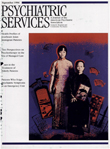Feigned psychiatric symptoms in the emergency room
Abstract
Psychiatrists providing emergency services at an urban general hospital completed questionnaires on 227 patients evaluated over a two-month period to assess whether they suspected the patient of malingering or of having secondary gains, and whether the patient was confronted about the suspicions. Thirteen percent of patients were strongly or definitely suspected of feigning symptoms; none received a primary diagnosis of malingering, and less than half were confronted. Suspected secondary gains included food and shelter, medications, financial gains, and avoidance of jail, work, or family responsibilities.
Access content
To read the fulltext, please use one of the options below to sign in or purchase access.- Personal login
- Institutional Login
- Sign in via OpenAthens
- Register for access
-
Please login/register if you wish to pair your device and check access availability.
Not a subscriber?
PsychiatryOnline subscription options offer access to the DSM-5 library, books, journals, CME, and patient resources. This all-in-one virtual library provides psychiatrists and mental health professionals with key resources for diagnosis, treatment, research, and professional development.
Need more help? PsychiatryOnline Customer Service may be reached by emailing [email protected] or by calling 800-368-5777 (in the U.S.) or 703-907-7322 (outside the U.S.).



